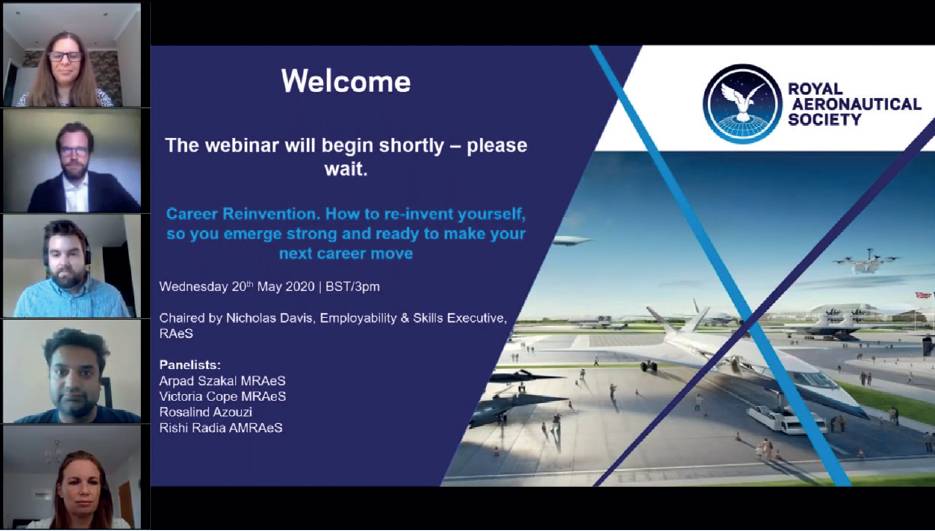Careers in crisis – Ten top tips to navigate through turbulent times ahead
 Many airlines around the world have declared redundancies. British Airways.What a difference six months make. In November 2019, the RAeS Careers team held one of its most successful annual careers fairs ever. Then Covid-19 turned the world upside down leaving civil aviation in crisis with large-scale redundancy programmes announcements affecting both supply chains and aerospace and aviation professionals at all career stages. To support those affected, the RAeS Careers team has run a series of careers and mentoring-themed webinars with expert panellists from across the Society’s membership to help provide practical advice and guidance. Here we bring together some key tips drawn from the sessions to help you navigate through the crisis.
Many airlines around the world have declared redundancies. British Airways.What a difference six months make. In November 2019, the RAeS Careers team held one of its most successful annual careers fairs ever. Then Covid-19 turned the world upside down leaving civil aviation in crisis with large-scale redundancy programmes announcements affecting both supply chains and aerospace and aviation professionals at all career stages. To support those affected, the RAeS Careers team has run a series of careers and mentoring-themed webinars with expert panellists from across the Society’s membership to help provide practical advice and guidance. Here we bring together some key tips drawn from the sessions to help you navigate through the crisis.
1. Online Learning and Networking
Actively seeking to advance your skills and learning, especially during unexpected downtime, can help you develop your knowledge and networks. Now, more than ever, there is a vast range of online learning tools and methods, such as, webinars, blogs and other publications available for free, many of which would normally incur hefty fees. Secondly, joining platforms, such as Alta, can help you make useful contacts and develop your ‘virtual’ skills. They can also help you identify career opportunities which may be advertised ‘word-of-mouth’, or help you find a mentor. If you haven’t used LinkedIn before, this may be the time to load up your profile and start connecting.
That said, not everyone has had more time during lockdown. Some working parents, in particular, have expressed concerns that balancing home schooling with working from home full-time has been exhausting, leaving little time for online events. Remember that many webinars are available to view online post-event, so you can still register for events which can be followed up when more time is available.
2. Mentoring
Online platforms make mentoring possible even during lockdowns, enabling you to connect with like-minded people who can share their advice and experiences with you. Maybe they have been through previous crises and can provide valuable insights on resilience, how to reinvent yourself, cope with change and find opportunities even if things seem bleak. Remember you can have more than one mentor helping you with different aspects of your career. You could also become a mentor to someone in their early career who may need some support – a great chance to give back, boost each other’s confidence and you may even pick up on new skills such as social media engagement.
 3. Transferable skills self-assessment
3. Transferable skills self-assessment
Employers not only use technical qualifications and direct experience when assessing applications. They also look for future employees who can blend in with, or lead, their existing teams, deal with customers, clients or suppliers, resolve problems, innovate, work under pressure and progress through their training programmes. It is not always easy to articulate these abilities to prospective employers. Now might be a good time to undertake a selfassessment of your soft skills. If you find yourself working in a role entirely outside aerospace/ aviation due to the crisis, this does not mean you won’t pick up valuable, transferable skills for your eventual return to the industry. Sectors such as logistics, medical, nuclear and rail offer particularly transferable experience but all experience counts and can help develop and enhance your existing knowledge and skills in unexpected ways.
4. Update your CV
You may not have written a CV in a long time, or may have never had it reviewed by a careers advisor. Seek expert advice and get started. Whether you are in your early or late career stage, a UK CV should normally be two pages long, whether for engineering or operational roles. This might prove challenging in practice but focus on your expertise and achievements on page one, reinforced by your employment history/personal activities on page two. Conversely, if you are moving away from the flight deck, two pages may seem too long but remember you will need to focus more on your soft skills for future roles, and less on pilot’s licence, type ratings and hours on type.
5. Careers coaching
Are you getting the most out of your job applications? Seek the advice of a careers expert and get some coaching. You are now in ‘sales mode’ and the product is you! Think about developing a toolkit of stories, highlighting various competencies you have gained through your education, previous roles, hobbies etc. A careers coach/professional can guide you through various aspects of the recruitment process, whether that is a CV feedback session, mock interviews or creative job search tips.